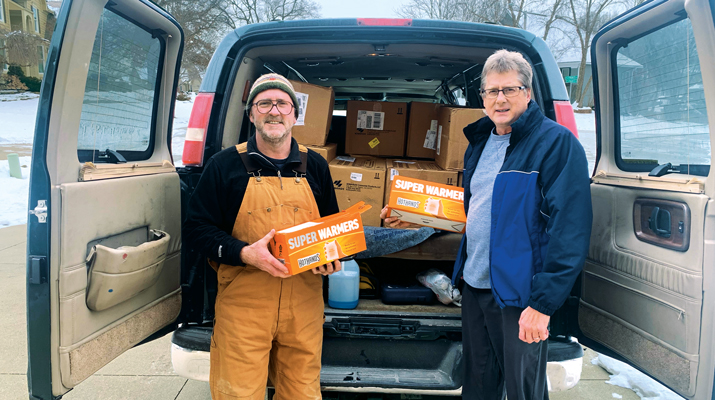There’s been an accident … now what?
If you’ve been in the propane business for more than a couple of years, you’ve heard a lot of safety and accident prevention presentations.
Employers, insurance companies and the National Propane Gas Association emphasize accident prevention, and that’s the way it should be; we all want to stop a problem before anyone gets hurt.
 Frank W. Beckstein III |
But what happens if an accident happens anyway? What should you do first? Who should you call? What should you do when reporters show up in your lot? Or when the government starts demanding access to your records?
Let’s look at a few key issues that arise whenever accidents happen and suggest a few possible responses.
Step one: Help anyone who is hurt
In any accident, the first concern is to help anyone who is hurt; forget about cause or liability for now. Post emergency numbers by your phones and in your vehicles. Do a “dry run” during a safety meeting and see how quickly your employees can respond. Encourage employees to learn CPR and first aid.
Step two: Eliminate the hazard
Do everything to eliminate the risk. If a bobtail is leaking, activate the remote. If a customer’s system has a leak, shut down the tank and evacuate. Do not try to become a firefighter. If you can safely act to prevent further harm, do so.
Step three: Notify the proper people
Your company needs a written plan to help employees notify the right people. The order of notification will depend upon what has happened, but a general guide is:
- Emergency notifications come first – Police, fire, rescue. You will need them on the scene as soon as possible.
- Corporate notifications – Upper management, risk management, safety. Get the right people to the scene.
- Federal and state agencies – Some states require notification to environmental agencies, industrial accident agencies and others. The jurisdiction of these agencies can be confusing and overlapping, leading to the need to work out a notification plan in advance.
- Neighbors, tenants and others – Some accidents, such as a large-scale release, should include notice to neighbors. If the threat is immediate, see Step Two above.
When you design your notification plan, be certain to specify who will give the notification, how it will be done and to whom. In dealing with government agencies, you also should work out the general form of what will be said.
Step four: Document the scene
The key to successfully defending propane lawsuits is preserving the scene.
There is no more important piece of information to remember after an accident. Any disturbance of the scene of a fire or explosion can substantially lessen your ability to prove that you did not cause the accident. You must do everything possible to maintain the integrity of the scene until your safety people, lawyers and experts have arrived.
Try to follow these tips:
- Take pictures – As many as you can. Buy disposable cameras and put them in your trucks. Teach your drivers and techs to use them. At an accident scene, start at the tank, and take photos of every part of the system. Photograph other fuels or appliances on site. Photograph data plates on appliances and tanks. Photograph debris, active fire, vehicles at the scene and bystanders.
- Draw a sketch – Include the structure, utilities, neighboring buildings and streets and a layout of the gas system. Measurements are not required but can be helpful.
- Preserve equipment – Do not surrender custody of company property to anyone who is not a public safety official. Even then, insist on an opportunity to photograph equipment. Get a written agreement that no testing will be done without advance notification to the company. Physical evidence is critical; don’t give it away, throw it away or allow anyone else to mess with it.
- Identify witnesses – Write the names, addresses, telephone numbers and e-mail addresses of everyone at or near the site. Don’t try to interview them; that’s someone else’s job.
- Identify officials – Do the same with police, fire and other officials who respond to the scene.
- Keep basic notes – Make legible notes about everything that happens at the scene. Note just the facts – no theories, opinions or speculation.
- Work with officials – In most jurisdictions, fire and police personnel have legal control of an accident scene until their investigation is completed. Introduce yourself to the officer in charge. Offer factual information as requested and technical support to prevent further harm. Request that the officials defer any significant changes in the scene until your counsel and experts can be present.
Step five: Gather other evidence
There is other useful information that can disappear if you do not gather it quickly. You may need it for your defense.
- “Freeze” your customer files – Do not add or remove anything from your customer records. Pull the files and turn them over to your counsel. Do not supply pieces of your files to officials, investigators, insurance people or reporters. Let counsel deal with requests for records.
- Gather installation-related documents – You often will have other documents that, although they are not part of the customer file, will relate to some issue in the case. Did you install an appliance recently? If so, pull copies of the installation and service manuals from an identical product and make copies for your lawyer.
- Gather training and personnel records – Gather your records regarding the hiring, training and discipline of employees involved in the incident and turn them over to counsel. Do not permit anyone else to have access to these records without clearing it with counsel.
Step six: Avoid the major mistakes
You have an obligation to do no harm after an accident. My list of major mistakes, to be avoided at all costs, includes the following:
- Do not offer opinions or speculation about causes or liability. These are concerns to be addressed by others after a thorough investigation.
- Do not provide oral, written or recorded statements to anyone. Do not allow your employees to do so, either. Wait until you have advice from your counsel and employer.
- Do not talk with reporters, and make sure your employees don’t either. There is nothing to be gained and much to be lost. Let the company or counsel handle this.
- Do not write accounts of what you think happened. If you are required to prepare an accident report, make it short and purely factual.
- Do not assume that lawsuits will not follow. Treat every accident as if a lawsuit is likely – because it is.
If an accident happens, it’s too late for prevention, but you still can follow the basic rules and procedures and maximize your ability to defend yourself by preserving critical evidence.
Beckstein leads the Energy & Utility Group at Nelson, Kinder, Mosseau & Saturley in Boston and Manchester, N.H. He sits on the board of directors of the Propane Gas Defense Association and regularly defends LPG wholesalers and retailers and manufacturers of LPG equipment. He can be reached at fbeckstein@nkms.com.
















